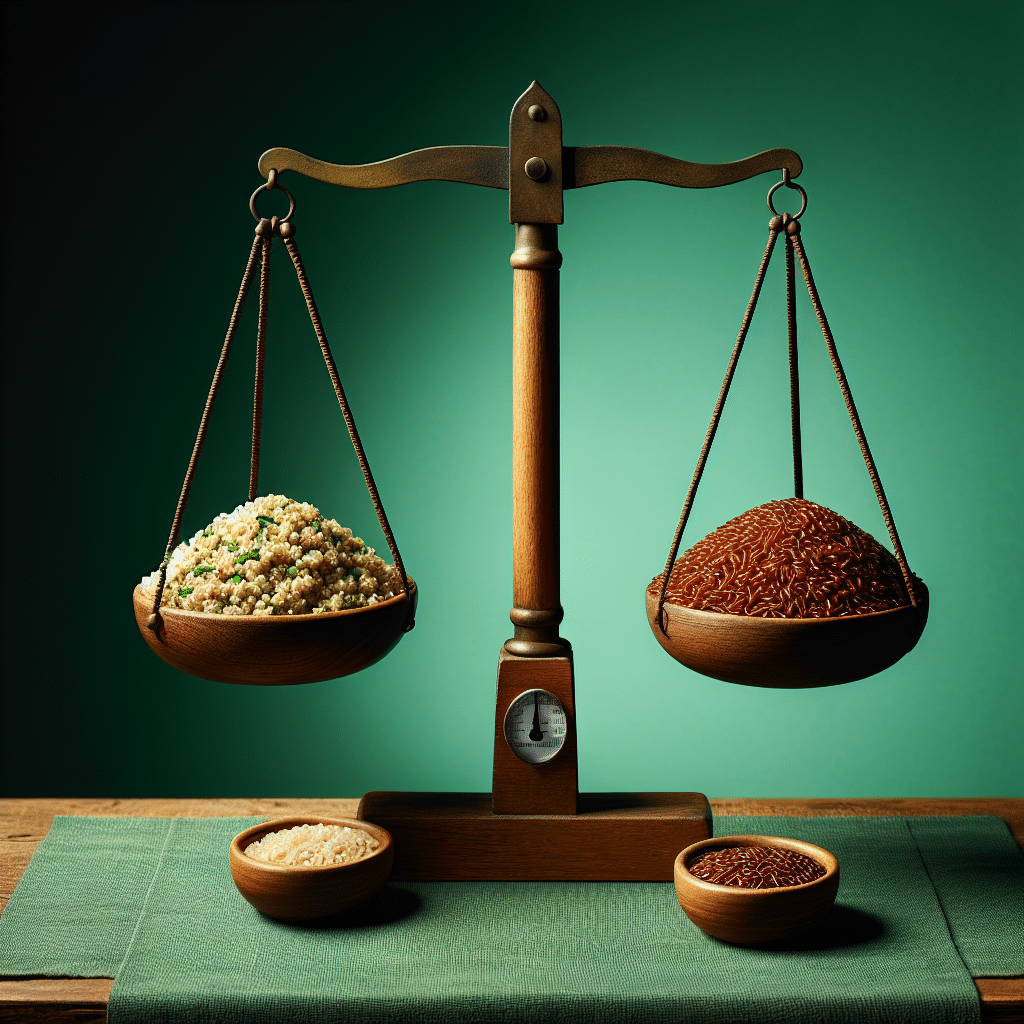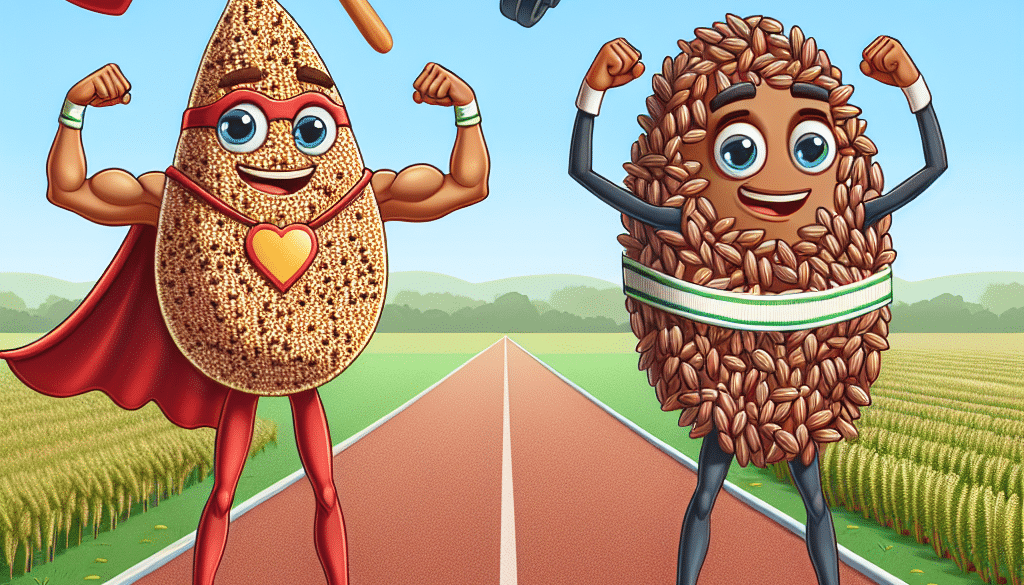What Is Healthier Quinoa Or Brown Rice?
-
Table of Contents
- Quinoa vs. Brown Rice: Which Is the Healthier Choice?
- Nutritional Comparison of Quinoa and Brown Rice
- Health Benefits of Quinoa and Brown Rice
- Potential Drawbacks
- Culinary Uses and Versatility
- Environmental Impact
- Conclusion: Making the Healthier Choice
- Enhance Your Diet with ETprotein’s Quality Protein Products
Quinoa vs. Brown Rice: Which Is the Healthier Choice?

When it comes to choosing whole grains for a healthy diet, quinoa and brown rice are two popular contenders. Both are touted for their health benefits, including being good sources of fiber, vitamins, and minerals. However, consumers often find themselves at a crossroads when deciding which is the healthier option. This article delves into the nutritional profiles, health benefits, and potential drawbacks of quinoa and brown rice to help you make an informed decision.
Nutritional Comparison of Quinoa and Brown Rice
Understanding the nutritional content of quinoa and brown rice is crucial to determining which is healthier. Here’s a breakdown of their key nutritional components:
- Protein: Quinoa is a complete protein, meaning it contains all nine essential amino acids. With approximately 8 grams of protein per cup, it’s a superior choice for vegetarians and vegans. Brown rice, on the other hand, offers about 5 grams per cup and is not a complete protein.
- Fiber: Both grains are good fiber sources, but quinoa edges out with about 5 grams per cup compared to brown rice’s 3.5 grams. Fiber is essential for digestive health and can help prevent chronic diseases.
- Vitamins and Minerals: Quinoa is rich in magnesium, iron, potassium, and zinc. It also contains B-vitamins such as folate. Brown rice is not far behind, with decent amounts of magnesium and vitamins, particularly B-vitamins.
- Antioxidants: Quinoa contains a higher level of antioxidants compared to brown rice. These compounds help combat oxidative stress and reduce the risk of chronic diseases.
- Calories and Carbohydrates: Both grains are similar in their calorie content, with quinoa at around 222 calories per cup and brown rice at 218. However, quinoa has slightly fewer carbohydrates.
Health Benefits of Quinoa and Brown Rice
Both quinoa and brown rice offer a range of health benefits, making them excellent additions to a balanced diet.
- Weight Management: The fiber content in both grains can help you feel full longer, potentially aiding in weight management.
- Blood Sugar Control: The low glycemic index of these grains makes them suitable for people with diabetes or those looking to maintain stable blood sugar levels.
- Heart Health: The fiber, antioxidants, and nutrients in quinoa and brown rice contribute to cardiovascular health by reducing blood pressure and cholesterol levels.
- Digestive Health: The fiber in both grains promotes regular bowel movements and a healthy digestive system.
Potential Drawbacks
While both grains are healthy, they have potential drawbacks to consider:
- Phytic Acid: Both quinoa and brown rice contain phytic acid, which can bind to minerals and reduce their absorption. However, soaking or sprouting the grains can help mitigate this effect.
- Arsenic Levels: Brown rice has been found to contain trace amounts of arsenic. Consuming a varied diet can help minimize the risk associated with arsenic exposure.
Culinary Uses and Versatility
Quinoa and brown rice can be used interchangeably in many recipes, from salads to stir-fries. Quinoa cooks faster than brown rice and has a unique fluffy texture, while brown rice offers a chewy, nutty flavor. The versatility of both grains makes them staples in kitchens around the world.
Environmental Impact
When considering sustainability, quinoa and brown rice have different environmental footprints. Quinoa is often praised for its ability to grow in harsh conditions with minimal water, making it a more sustainable choice in arid regions. Brown rice requires more water to grow, which can be a concern in water-scarce areas.
Conclusion: Making the Healthier Choice
In the debate between quinoa and brown rice, quinoa appears to have a slight edge due to its higher protein content, complete amino acid profile, and greater antioxidant levels. However, both grains are nutritious and can be part of a healthy diet. The choice may ultimately come down to personal preference, dietary needs, and environmental considerations.
Enhance Your Diet with ETprotein’s Quality Protein Products
If you’re looking to boost your protein intake with high-quality, plant-based options, consider ETprotein’s range of organic vegan proteins. Their products, including organic rice protein and pea protein, are non-GMO, allergen-free, and feature a neutral taste, making them an excellent addition to any diet.
About ETprotein:
ETprotein, a reputable protein and L-(+)-Ergothioneine (EGT) Chinese factory manufacturer and supplier, is renowned for producing, stocking, exporting, and delivering the highest quality organic bulk vegan proteins and L-(+)-Ergothioneine. They include Organic rice protein, clear rice protein, pea protein, clear pea protein, watermelon seed protein, pumpkin seed protein, sunflower seed protein, mung bean protein, peanut protein, and L-(+)-Ergothioneine EGT Pharmaceutical grade, L-(+)-Ergothioneine EGT food grade, L-(+)-Ergothioneine EGT cosmetic grade, L-(+)-Ergothioneine EGT reference grade and L-(+)-Ergothioneine EGT standard. Their offerings, characterized by a neutral taste, non-GMO, allergen-free attributes, with L-(+)-Ergothioneine purity over 98%, 99%, cater to a diverse range of industries. They serve nutraceutical, pharmaceutical, cosmeceutical, veterinary, as well as food and beverage finished product distributors, traders, and manufacturers across Europe, USA, Canada, Australia, Thailand, Japan, Korea, Brazil, and Chile, among others.
ETprotein specialization includes exporting and delivering tailor-made protein powder and finished nutritional supplements. Their extensive product range covers sectors like Food and Beverage, Sports Nutrition, Weight Management, Dietary Supplements, Health and Wellness Products, and Infant Formula, ensuring comprehensive solutions to meet all your protein needs.
As a trusted company by leading global food and beverage brands and Fortune 500 companies, ETprotein reinforces China’s reputation in the global arena. For more information or to sample their products, please contact them and email sales(at)ETprotein.com today.












